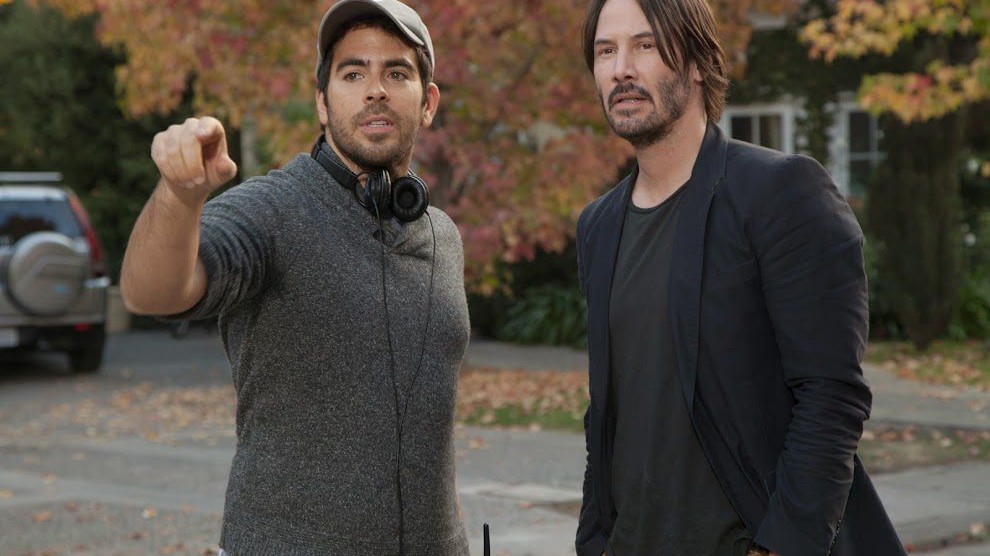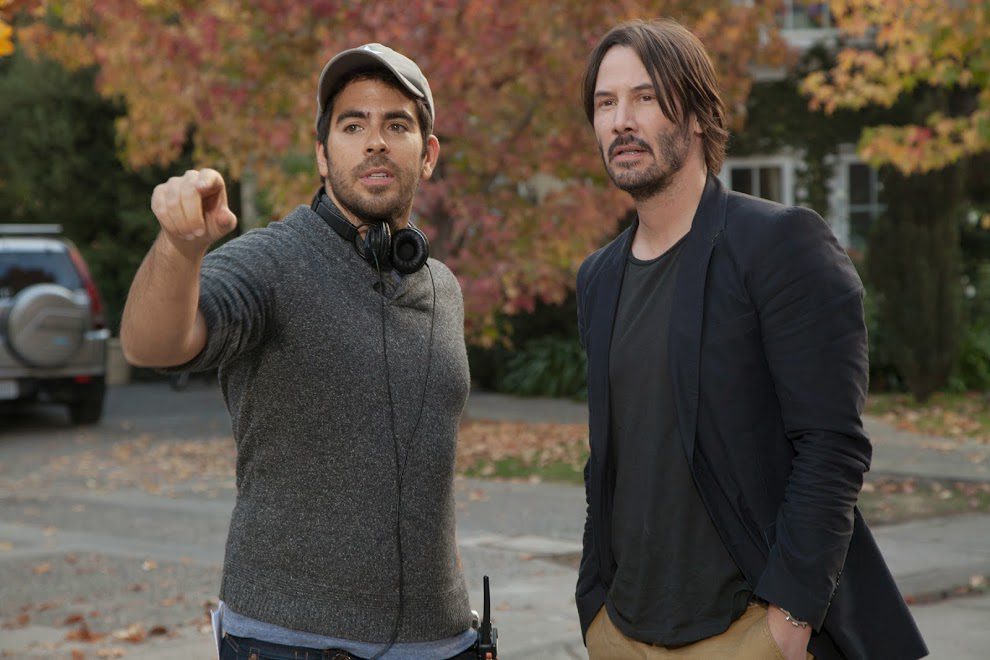The cult fanbase of horror director Eli Roth should be in for a surprising treat with the arrival of his latest film, Knock Knock, a new sexual thriller that exchanges the dismemberment of bodies for the thrilling aspects of what comes with a night of shared infidelity between a do-good family man and two sexy, if totally out-of-their-minds strangers, intent on putting the “fatal” in “fatal attraction.” Cinemacy recently had the chance to attend the LA press conference for the film, where the film’s stars– Roth and leading man Keanu Reeves–spoke about making the movie. We begin:
There’s a point in Knock Knock when two intruders start trashing their victim’s house, along with the many pieces of original art that is in it. How does that compare to dismembering bodies in your other movies?
Eli Roth: Well, I’m glad you picked up on that. My other films are certainly known for the visceral and the gore, and with this, we substituted the chopping off of Aaron’s (Burns) head, in The Green Inferno, for sawing off the heads of the statues. And in a crazy way, I found it more disturbing.
My mother’s an artist, and we grew up with her art all over the house, and it was very careful. You know, you don’t want to bump into a painting; you don’t want to scratch anything.
We found some amazing, amazing, artists in Chile to create this work. And I remember even when we were shooting it, with the girls, there was an element–you know, when you’re doing a kill scene in a movie, you really want to get it right, and make it look right–but when they were destroying the art… I mean, everyone was in character, and we went for it.
But, there is a feeling like, “Oh my god, we’re really destroying these objects.” But then of course, they spray paint ‘Art does not exist,’ which is the very question–“what is art?” Is it the object that’s artistic, or the value you place on it? Because I know with my films, to one person they can be complete garbage, and to another person they’re a work of art. So, what is art?
Read our review of ‘Knock Knock,’ here.
Can you talk about the premise of this film? Is it a cautionary tale to not fool around?
ER: I would say that, for sure it’s a cautionary tale. But it’s also, in a way… when there’s problems in a relationship, if you don’t deal with it, it’s probably going to come out in your behavior one way or another. Seemingly, on the surface, Evan has a very happy life, but you can see there’s a little frustration. He’s not having sex, or he’s using the monster voice… it’s almost as if he never directly addresses the problems in the relationship. She gets really mad and he’s like, “sorry, sorry, sorry!” And then it’s Father’s Day, and they still leave him and it’s… the house is her artwork everywhere, and it’s all about her. And the catalogue, and even though he’s still there, he’s kind of just managing the house. So there are frustrations. You could almost make the argument the girls are created from this part of his id, that just wanted to destroy whatever life happened.
I would say that, for sure it’s a cautionary tale. But it’s also, in a way… when there’s problems in a relationship, if you don’t deal with it, it’s probably going to come out in your behavior one way or another.
Keanu, towards the end of the film, your character has an intense, desperate monologue, in which he justifies how these girls who showed up at his door were like “free pizza.” There was a lot of shouting in it. How many times did you have to deliver that?
Keanu Reeves: Yeah, it was a really exciting moment to do that scene. We shot it twice, because the first time, I guess I wasn’t up for the task. And then, because we got to play the scene, we got to learn something from that. And then I got back to the hotel, and I was crying. And I called Eli and I said, “Please, can we do the scene again?” And Eli was just like… there was a long pause on the phone. And being the great person and director that he is, (he says) “OK,” so we could shoot it again.
ER: I mean, he was hugging me while he was crying. It wasn’t on the phone.
(Laughter)
No, I mean, it was shooting nights, it was very difficult on all the cast. You know, we’re having lunch at 2:30 in the morning. And I just want to say what an honor it was to work with everyone, right down to Aaron, and (producer) Colleen (Camp), Lorenza (Izzo), Keanu (Reeves), Anna (Izzo), and Ignacia (Allamand).
They were such troopers, but, you know, there is a point where it hits six in the morning, and (Keanu) literally had no voice, and was out of gas. And we’re like, “this is your moment.” We’d say like, “this is your Oscar clip!” Like, this is that moment where he finally breaks and voices what the audience is thinking, like, “well how the fuck did this happen!” It’s total helplessness. And so I remember we came in fresh the next day and it was just beautiful to watch.

Do you like playing the victim?
KR: Oh the victim is fun in movies!
(Laughter)
Eli created a great situation of trust, and Lorenza and Anna, we had such love for the material, and we rehearsed in the house for like a week, and we really got to kind of know each other, and know our perspectives on the roles, and really what were the limits and where was the fun. Because the film, there’s a seduction, yes. But what does that look like? And then there’s also comedy, there’s thriller, and there are some really emotional scenes. And it was great to get the chance to work together, and to flesh the project out, and with such great material.
Eli, your previous movies have pushed the boundaries with how scary you can make something on a physically torturous level. How was it making a scary movie that took a more psychological approach?
ER: You know, it’s interesting… I think that at this point in my career, there’s no way I can divorce myself from horror. I can only transition, and make different types of movies, because I’m so strongly associated with it. So the hope is that people watch it as its own contained film, not necessarily as like the fifth chapter in some sort of long-form horror series.
To me, this really is a drama, it’s a thriller, it’s a sexual thriller. I think if you put it in the category of horror, it kind of gives the audience the wrong experience. And I’m not criticizing that, I completely understand why people would think that. I don’t want people to think it’s a horror movie with no blood. It really, truly does follow the conventions of that sort of thriller. But for me, it was fun to get into the psychology of those characters, to write them from the point of view that nobody’s wrong, and everyone fully believes in what they’re doing.
And that’s always scary to me, when someone does something, because they so truly believe what they’re doing, either that there’s some larger cause for it, or they believe they’re right, or they justify it in their own head. And that’s what I think is interesting, and dangerous, and exciting. The idea that Keanu’s character Evan, he knows it’s wrong, but he’s justified it in his own head, and the girls know what they’re doing is wrong, but they’ve justified it in their own head. What happens when those two worlds meet?
Knock Knock is now playing in theaters.
Ryan Rojas
Ryan is the editorial manager of Cinemacy, which he co-runs with his older sister, Morgan. Ryan is a member of the Hollywood Critics Association. Ryan's favorite films include 2001: A Space Odyssey, The Social Network, and The Master.


